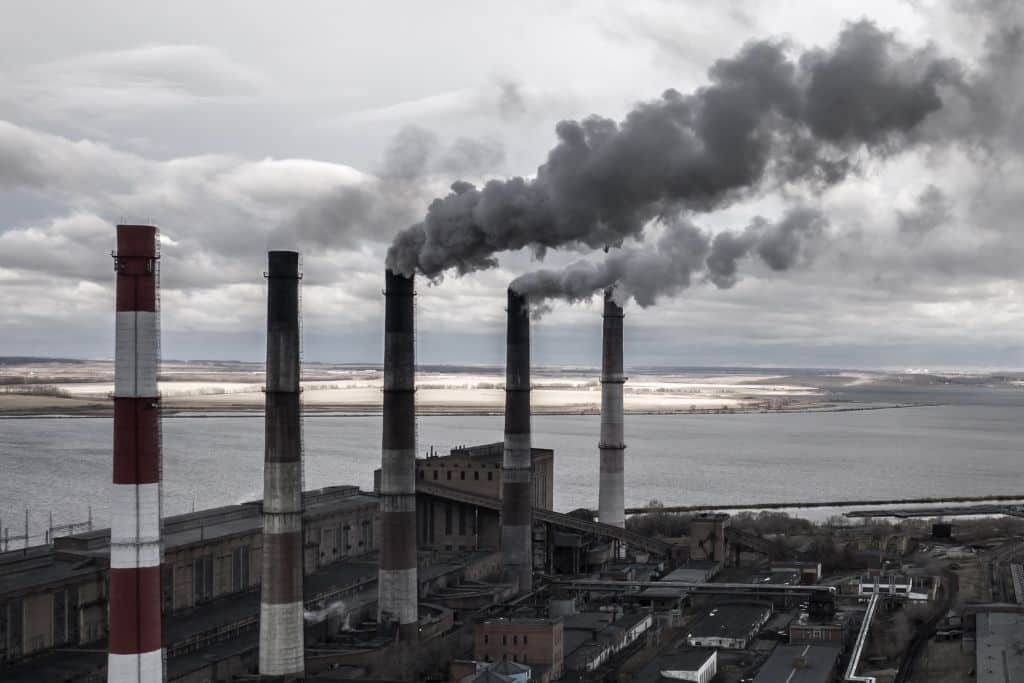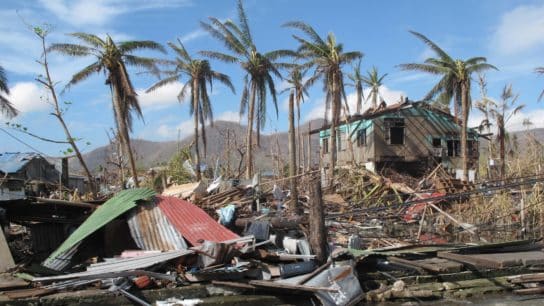Despite millions of people dying from the consequences of climate change-related events each year, governments are still investing six times more money on supporting fossil fuels than on transitioning to renewable energies. However, leading economic organizations agree that these subsidies are expensive, inefficient and harmful to the economy.
—
In 2022, global fossil fuel subsidies were US$7 trillion, or 7% of global GDP – roughly equal to the total economies of the UK and Germany combined. Meanwhile, in 2021, exposure to air pollution led to 8.1 million deaths globally.
Around the world, governments are pouring trillions of taxpayer money to support an industry that boasts of billions of dollars in profits each year. It is also an industry that can be directly tied to the deaths of millions of human beings, is the biggest contributor to climate change and the destruction of the planet’s ecosystems. So why are governments still subsidizing it?
The Real Price of Fossil Fuel Subsidies
Throughout the decades, subsidies for fossil fuels have helped bring down energy prices, contributing to increasing economic output and growth. Governments also use these subsidies to bring down inflation by reducing the prices of energy, transportation and a whole range of other products affected by the supply of fossil fuels. Just recently, governments increased subsidies to bring down energy prices that spiked due to the war in Ukraine and post-pandemic recovery.
As the past has shown us, these policies can have a real impact on the cost of living. By one estimate, a $0.25 decrease in per liter subsidy results in a 6% decrease in income for all groups in society. So, fossil fuel subsidies are generally perceived as a tool used to help reduce the cost of living that specifically helps the poor. A rise in fossil fuel prices often sparks social unrest, such as the yellow vest protests that took place in France in 2018 or the unrest in the oil town of Zhanaozen, Kazakhstan, in 2022.

But the notion that fossil fuel subsidies help the poor could not be further from the truth. According to an International Monetary Fund (IMF) study, these subsidies overwhelmingly favor the rich and are an extremely ineffective and expensive way to support the lower income sections of society. They estimate that the richest 20% of society perceives 43% of the benefit, while the poorest 20% gets only 7%. Transferring $1 to the poorest 20% via gasoline subsidies costs $33, which means that for every 100 dollars of gasoline subsidy, 97 “leak” to the top four quintiles.
What’s more, these estimations do not even take into account the health problems caused by air pollution or the consequences of climate change, which are disproportionately suffered by the poor. And even though fossil fuel subsidies might reduce the cost of living in the short term, these subsidies constitute an astronomical burden for the public budget. This means that in order to pay for the subsidies, governments are forced to acquire debt, increase taxes, and reduce expenditure in public services, all of which further harm the pocket and standard of living of low-income households.
Besides the inherent inequality of these subsidies, their deficiencies extend far beyond. Only 18% of the fossil fuel subsidies in 2022 were explicit subsidies, such as tax cuts, 82% were implicit subsidies, which are basically an undercharging for the negative effects of fossil fuels. For example, with products like tobacco, sugar, or plastic, different strategies such as taxes or fees are often applied to increase their price so that it covers the real cost to the public health and environment. Ideally, this should also be the case with fossil fuels, and yet, all the damages the industry is linked to are systematically underrepresented in fossil fuel prices around the world.
Fossil fuels accounted for 82% of the global energy mix in 2023 and are the main contributors to global warming. Climate change is expected to displace 140 million people by 2050 and cost $69 trillion by the end of the century, creating unmeasurable amounts of human suffering. The health risks related to the air pollution created by the burning of fossil fuels include several types of cancer, cardiovascular diseases. and even the reduction of cognitive ability. Air pollution is also absorbed by the oceans, altering their acidity and thus compromising entire ecosystems, killing animals and plants alike. Hundreds of thousands of species are expected to disappear. Through the damaging of ecosystems, air pollution also disrupts fishing and agriculture, exacerbating hunger crises.
You might also like: Will We Ever Be Able to Go Without Fossil Fuels?
What Is the Alternative?
Organizations such as the IMF and the World Bank are emphatic that fossil fuel subsidies must be scrapped. Reforming fossil fuel pricing would raise an estimated $4.4 trillion in tax revenues, which is more than the investment needed to achieve the UN Sustainable Development Goals. These reforms would reduce fossil fuel emissions by 34% below 2019 levels, placing humanity on track to limit global warming to 1.5-2C over pre-industrial levels, a goal established in the Paris Agreement. It is also estimated that removing subsidies would prevent more than 1.5 million deaths a year caused by fossil fuel-driven air pollution.
Fossil fuel subsidies substantially incentivize investment in this type of energy by making investments more profitable and less risky. A reform that increases the prices of fossil fuels would in turn make renewable energies more competitive, increasing the investments in this field and accelerating the transition to green energy.
But reforming the system is not a straightforward task. Back in 2009, G20 nations committed to phasing out fossil fuel subsidies but despite modest progress in some countries, this has not happened. Governments are wary of the social unrest this could cause and the potential effects on inflation, though, as mentioned before, these subsidies are an extremely inefficient way to support the most vulnerable, and there are several ways to address these possible shortcomings.
Some of the immense tax revenues created by these reforms could be used to mitigate the negative effects on the poor through the enhancement of public services and investment in social programs, such as “school meals, reduced education and health user fees, subsidized mass urban transport, cash transfers to vulnerable groups, or subsidies for consumption of water and electricity below a specified threshold.” In countries where the social safety nets are not adequate, gradual reforms are recommended. Additionally, campaigns to educate the public on the meaning of the reforms are an imperative.
Another obstacle faced by the reform endeavors are the mighty oil lobbies that wield a tremendous influence on decision makers and public opinion. According to one report, the five biggest oil companies spend $200 million a year on lobbying “designed to control, delay, or block binding climate-motivated policy”. Another report found that in 2021, 60% of these companies’ public communications material was mere greenwashing. These companies were also found to be spending $750 million a year on climate-related communication activities. Meanwhile, only 12% of their capital expenditure is dedicated to “low carbon” activities, highlighting the contrast between the public image fossil fuel companies try to shape and the real consequences of their policies. These issues can be tackled with a ban on fossil fuel advertising like the one existing for tobacco, as the Secretary-General of the United Nations Antonio Guterres argued last June. Further, the reform process should be depoliticized, for instance by introducing automatic pricing mechanisms, thus neutralizing the influence of the oil lobby on politicians.
Featured image: Wikimedia Commons.
How can I contribute to a more sustainable planet?
- 🗳️ Vote for Climate Action: Exercise your democratic rights by supporting candidates and policies that prioritize climate change mitigation and environmental protection. Stay informed with Earth.Org’s election coverage.
- 👣 Reduce Your Carbon Footprint: Make conscious choices to reduce your carbon footprint. Opt for renewable energy sources, conserve energy at home, use public transportation or carpool, and embrace sustainable practices like recycling and composting.
- 💰 Support Environmental Organizations: Join forces with organizations like Earth.Org and its NGO partners, dedicated to educating the public on environmental issues and solutions, supporting conservation efforts, holding those responsible accountable, and advocating for effective environmental solutions. Your support can amplify their efforts and drive positive change.
- 🌱 Embrace Sustainable Habits: Make sustainable choices in your everyday life. Reduce single-use plastics, choose eco-friendly products, prioritize a plant-based diet and reduce meat consumption, and opt for sustainable fashion and transportation. Small changes can have a big impact.
- 💬 Be Vocal, Engage and Educate Others: Spread awareness about the climate crisis and the importance of environmental stewardship. Engage in conversations, share information, and inspire others to take action. Together, we can create a global movement for a sustainable future.
- 🪧 Stand with Climate Activists: Show your support for activists on the frontlines of climate action. Attend peaceful protests, rallies, and marches, or join online campaigns to raise awareness and demand policy changes. By amplifying their voices, you contribute to building a stronger movement for climate justice and a sustainable future.
For more actionable steps, visit our ‘What Can I do?‘ page.















